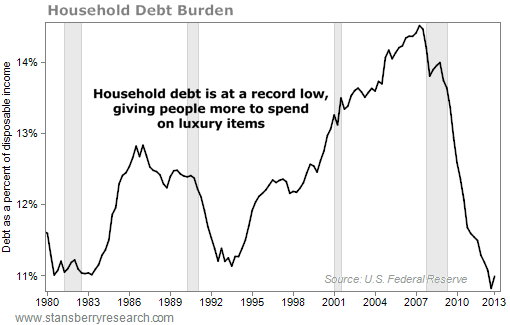Imagine your spouse sent you to the grocery store to pick up a few regular items you use day in and day out items with a far-off expiration date, like cans of tuna. At the store, you discover the tuna you've been buying for $4 a can is now on sale for $2 a can. What would you do?
I know what I'd do. I'd buy more cans. If I usually bought 25 cans, I could now buy 50 for the same price. I might even stock up 100 cans or more; and yet it seems a lot of investors would rather shout at the manager.
In the fixed-income market these days, people are seeing the price of interest-generating bonds and notes drop; and they're complaining about "losing money." It's like griping that the tuna is on sale.
The core reason to buy a fixed-income investment is just that to generate income. Whether you buy a fund or a single security, you're agreeing to give them your capital in exchange for regular income payments.
But unlike stocks that might also pay income in the form of a dividend... fixed-income investments are not principally focused on the capital gains that can come from falling interest rates. (Remember... bond prices and interest rates move in opposite directions.)
Muni-bond funds – like our position in the Invesco Insured Municipal Income Trust (NYSE: IIM) – and high-yield bond funds – like our position in the iShares High Yield Bond Fund (NYSE: HYG) – have dropped in price. That means they're now paying a higher yield. Reinvesting your interest payments in the fund grows your income stream much faster. Plus, the money that the fund gets from maturing securities can now be put to work at even higher interest rates than a month or two ago.
When fixed-income securities are cheap – when the tuna is on sale – that is the time to buy more of them.
IIM is a great example... two weeks ago, the fund yielded 5.8%. It now yields 6.3%. And investors have overreacted to the bond market selloff, meaning IIM trades at a 6.7% discount to the value of holdings – its "net asset value" or "NAV.".
The municipal bonds IIM's managers are working to invest in now yield an average of 3.6%, up from 3% last month. That means a higher yield on reinvested funds.
But what if the bond market continues to fall and turns into something more extreme than your typical market correction? First, this is exactly why we spend so much time focused on sound asset allocation. Even if our fixed-income investments encounter problems, other parts of our portfolio should offset that. For example, our chaos hedges (like gold) exist for just such an extreme situation.
Also remember, we've mostly invested in diversified income funds. So even if default rates jump from historical levels, those losses will only represent a sliver of our investments. Most important as I said, capital gains are not our principal goal with fixed-income investments. The lower the prices, the better the opportunity to secure a bigger income stream. It's hard for me to imagine a sale that would be "too big" not to want to stock up.
Don't worry about the value or price of the fund. (Of course, you should always stick to your stops to protect your capital.) You're buying to create a balanced portfolio with a mix of securities. When you buy a muni bond fund like IIM, you're buying tax-free income.
Use the opportunity to add to your fixed-income allocations at lower prices and higher yields. Lock in the income while everyone else misses out.
News You Can Use
The U.S. household debt burden just hit a record low. The burden of debt in U.S. households has fallen to
its lowest level in more than 30 years (since it was first recorded in 1980). The amount of a household's
debt payment as a percent of disposable personal income fell to just 10.4%, according to the Federal
Reserve.
As you can see in the chart below. U.S. debt soared during the economic downturn. But today, it's plummeting.
I know what I'd do. I'd buy more cans. If I usually bought 25 cans, I could now buy 50 for the same price. I might even stock up 100 cans or more; and yet it seems a lot of investors would rather shout at the manager.
In the fixed-income market these days, people are seeing the price of interest-generating bonds and notes drop; and they're complaining about "losing money." It's like griping that the tuna is on sale.
The core reason to buy a fixed-income investment is just that to generate income. Whether you buy a fund or a single security, you're agreeing to give them your capital in exchange for regular income payments.
But unlike stocks that might also pay income in the form of a dividend... fixed-income investments are not principally focused on the capital gains that can come from falling interest rates. (Remember... bond prices and interest rates move in opposite directions.)
Muni-bond funds – like our position in the Invesco Insured Municipal Income Trust (NYSE: IIM) – and high-yield bond funds – like our position in the iShares High Yield Bond Fund (NYSE: HYG) – have dropped in price. That means they're now paying a higher yield. Reinvesting your interest payments in the fund grows your income stream much faster. Plus, the money that the fund gets from maturing securities can now be put to work at even higher interest rates than a month or two ago.
When fixed-income securities are cheap – when the tuna is on sale – that is the time to buy more of them.
IIM is a great example... two weeks ago, the fund yielded 5.8%. It now yields 6.3%. And investors have overreacted to the bond market selloff, meaning IIM trades at a 6.7% discount to the value of holdings – its "net asset value" or "NAV.".
The municipal bonds IIM's managers are working to invest in now yield an average of 3.6%, up from 3% last month. That means a higher yield on reinvested funds.
But what if the bond market continues to fall and turns into something more extreme than your typical market correction? First, this is exactly why we spend so much time focused on sound asset allocation. Even if our fixed-income investments encounter problems, other parts of our portfolio should offset that. For example, our chaos hedges (like gold) exist for just such an extreme situation.
Also remember, we've mostly invested in diversified income funds. So even if default rates jump from historical levels, those losses will only represent a sliver of our investments. Most important as I said, capital gains are not our principal goal with fixed-income investments. The lower the prices, the better the opportunity to secure a bigger income stream. It's hard for me to imagine a sale that would be "too big" not to want to stock up.
Don't worry about the value or price of the fund. (Of course, you should always stick to your stops to protect your capital.) You're buying to create a balanced portfolio with a mix of securities. When you buy a muni bond fund like IIM, you're buying tax-free income.
Use the opportunity to add to your fixed-income allocations at lower prices and higher yields. Lock in the income while everyone else misses out.
News You Can Use
The U.S. household debt burden just hit a record low. The burden of debt in U.S. households has fallen to
its lowest level in more than 30 years (since it was first recorded in 1980). The amount of a household's
debt payment as a percent of disposable personal income fell to just 10.4%, according to the Federal
Reserve.
As you can see in the chart below. U.S. debt soared during the economic downturn. But today, it's plummeting.
The Fed's low-interest-rate policy has given people a chance to pay down debts and refinance the interest payments. Of course, some debt has been defaulted upon, too. Either way, the U.S. consumer now has the most potential borrowing power in my investing lifetime.
And lower debt payments means people could have more money to spend on travel, luxury items, and investing. That's good news for keeping the U.S. economy chugging along.
And lower debt payments means people could have more money to spend on travel, luxury items, and investing. That's good news for keeping the U.S. economy chugging along.


 RSS Feed
RSS Feed
